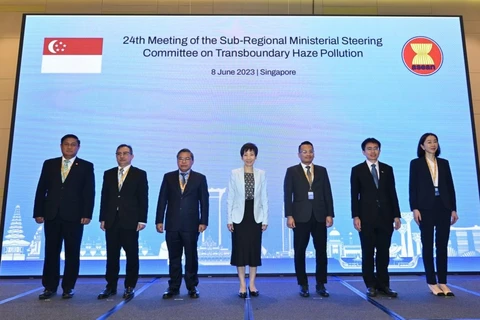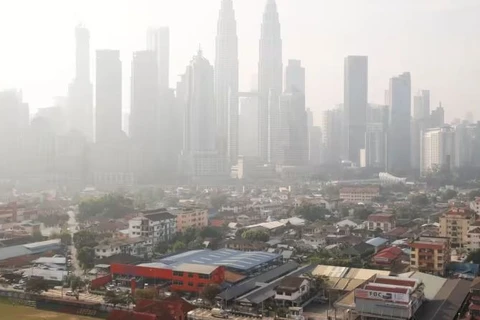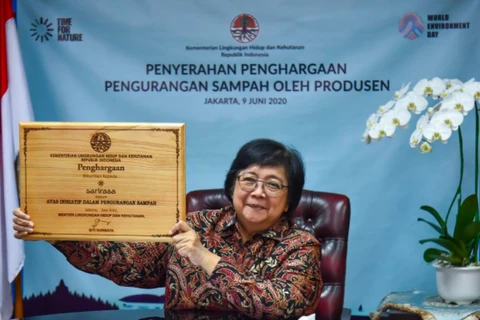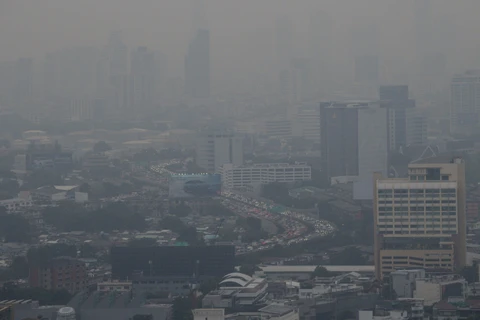Hanoi (VNA) – Malaysia’s Environment Ministry has announced that the country will not proceed with a proposed bill to prevent transborder haze pollution because of difficulties in obtaining the necessary information for prosecution purposes.
Almost every dry season, smoke from fires to clear land for palm oil and pulp and paper plantations in Indonesia blankets much of the Southeast Asia region including Malaysia and Singapore, leading to concerns for public health and disruptions to travelling and tourism activities.
To address the issue, in 2014, Singapore passed the Transboundary Haze Pollution Act 2014, aiming to hold those who cause haze both criminally and civilly liable.
Malaysia's environment ministry said in a written reply to parliament on November 6 that it will not go ahead with a law, citing difficulty in enforcing it.
The ministry said a diplomatic approach through negotiations was a better way to "collectively address" haze issues involving international borders.
To enable the enforcement of a transboundary haze pollution bill, clear evidence that transboundary haze originates from neighbouring countries must be supported by sufficient data such as location maps, coordinates, landowner information and companies operating in the location of fires, the ministry said.
It said such information was difficult to obtain as it involved matters of confidentiality, security and national sovereignty.
Indonesia pledged to take measures to deal with the haze spreading to neighbouring countries, but this situation keeps happening every dry season. Last month, Malaysia called on Indonesia and the Association of Southeast Asian Nations (ASEAN) to intervene when air quality in the country reached serious levels.
Environmental protection organisation Greenpeace believes that the cross-border haze law is a measure to prevent and possibly identify companies that burn forests.
According to the organisation, since Singapore enacted its haze law, no individual or organisation has been fined or sued. That does not mean that the law is not effective because some companies were investigated due to involvement in forest fires./.
Almost every dry season, smoke from fires to clear land for palm oil and pulp and paper plantations in Indonesia blankets much of the Southeast Asia region including Malaysia and Singapore, leading to concerns for public health and disruptions to travelling and tourism activities.
To address the issue, in 2014, Singapore passed the Transboundary Haze Pollution Act 2014, aiming to hold those who cause haze both criminally and civilly liable.
Malaysia's environment ministry said in a written reply to parliament on November 6 that it will not go ahead with a law, citing difficulty in enforcing it.
The ministry said a diplomatic approach through negotiations was a better way to "collectively address" haze issues involving international borders.
To enable the enforcement of a transboundary haze pollution bill, clear evidence that transboundary haze originates from neighbouring countries must be supported by sufficient data such as location maps, coordinates, landowner information and companies operating in the location of fires, the ministry said.
It said such information was difficult to obtain as it involved matters of confidentiality, security and national sovereignty.
Indonesia pledged to take measures to deal with the haze spreading to neighbouring countries, but this situation keeps happening every dry season. Last month, Malaysia called on Indonesia and the Association of Southeast Asian Nations (ASEAN) to intervene when air quality in the country reached serious levels.
Environmental protection organisation Greenpeace believes that the cross-border haze law is a measure to prevent and possibly identify companies that burn forests.
According to the organisation, since Singapore enacted its haze law, no individual or organisation has been fined or sued. That does not mean that the law is not effective because some companies were investigated due to involvement in forest fires./.
VNA

























